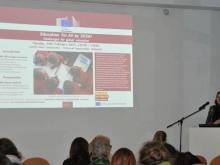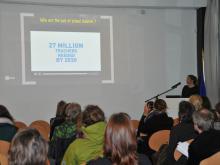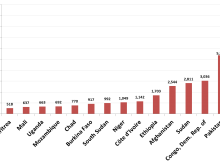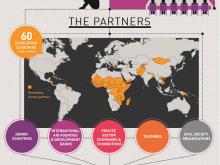The GPE – Global Partnership Education and the Education for All by 2030: Challenges for global education
The GPE – Global Partnership Education and the Education for All by 2030:
Challenges for global education
Infopoint Lunch Time Conference – 24.02.2015
Karen Schroh is Senior Donor Relations Specialist from the Global Partnership for Education (GPE) and was the special invited for the Lunch Time Conference Education for All by 2030? Challenges for global education.
What we have seen with the MDGs is a huge investment in increasing access to education, without the same investment insuring quality education. The result is many children dropping out or not learning. That’s why GPE have a plan for Education sector in each developing country focused on quality.This was the basic message of Karen Schroh.
2015 is a crucial year for development, a milestone on the international agenda. The Millennium Development Goals (MDGs) reach their 2015 deadline. They were designed to eradicate poverty and all 189 UN member states have committed to them. It is now when we look at what have been achieved over the past 15 years and draw the lessons learned. It's also the year when negotiations for the new agenda to replace the MDGs will come to an end and the post-2015 framework will be adopted at the UN General Assembly in September. If the future post 2015 education goals are to be met, all actors have to demonstrate stronger political leadership and work together for aid effectiveness.
So this was a perfect time to share opinions about the best and worst practices, expertise, knowledge and to discuss about how to work together, the GPE, the EU & MS, the IO, the civil society and the private sector, the national and local authorities with the partner countries.
This was DEVCO B4 Education second session under the thematic month of Education in the context of the European Year of Development 2015,at the Infopoint Lunch Time Conferences .
“We had several events last month were we have put full energy and passion in contributing to visibility of Education support in partner countries as it is a huge priority for the European Commission” ( a specific session dedicated to fragile context of Syria took place the previous day Conference "Syrian Children & Education: the EU-UNICEF commitment") . “ In the EU financial framework 2014-2020, the overall EU budget allocated to support education and training in developing countries stands at an estimated EUR 4.6 billion. While the bulk of the EU support to education is channelled through bilateral cooperation with 40 partner countries (about EUR 2.6 billion), EUR 265 million are devoted to the Global Public Goods and Challenges (GPGC) program and targeted primarily at supporting global education initiatives (EUR 175 million for the GPE) and education in situations of fragility” said Veronique Lorenzo, Head of Unit for Education at the European Commission’s Directorate-General for International Cooperation and Development.

“The European Comission, alongside other partners, remains one of the main donors to the partnership as GPE is fund but also coherence in our bilateral progress. When intervening jointly we make a remarkable job in increasing awareness about the importance of Education in Development policies”
“Moreover, very recently, two weeks ago, we had the pleasure to welcome in Brussels Julia Gillard, Chair of the Board of Directors of the Global Partnership for Education (GPE) and Former Prime Minister of Australia for a Kapuscinski Development lecture and in the lunchtime we had Karen Schroh, Senior Donor Relations Specialist for the GPE.”
Karen Schroh then took the floor and started her allocution by asking the assistance, around 50 people , of how many people knew about GPE before this day. Surprisingly, even with a so engaged audience on Education in Development countries as that one, few was aware. This Conference was also an opportunity for knowing in first-hand the work of this education partnership, as various people in the audience did not know about GPE, whose headquarters are in Washington but since last year with representation in Brussels.
What is the Global Partnership for Education?
The Global Partnership for Education brings together developing and donor countries, multilateral agencies, civil society organizations (CSOs) and the private sector and private foundations supporting the education sector in developing countries, with a particular focus on accelerating progress toward the Education for All goals of:
• expanding early childhood education
• providing free and compulsory basic education for all
• promoting learning and life skills for young people and adults
• increasing adult literacy
• achieving gender parity and gender equality; and
• improving the quality of education.
The GPE Compact, established in 2002 following the development consensus reached at Monterrey, links increased donor support for education to recipient countries’ policy performance and accountability for results.[1]
At that point Karen Schroh go further in this dialogue with a speech on "Education for All by 2030: Challenges for global education".
Two points where developed:
1- The post-2020 agenda
2- The role of GPE

With a very appellative and enlightening presentation that starts with the video" Who are the out of school children" the audience became aware that , even if “in 2000 we make a promise – all children in school" there are many still out of school because of child labour, children marriage, children soldiers, children disability, gender discrimination, conflicts, children in poverty, all of them marginalized for reasons that they don't control.
"What we have seen with the MDGs is a huge investment in increasing access to education, without the same investment insuring quality education. The result is many children dropping out or not learning. In the SDG agenda we have to try to focus on equity and quality as well as access if we are to reach the hardest to reach groups", said Karen Schroh, while presenting data on the number of children out of school, in several countries.
And proceed saying that GPE is the largest fund on Education in the world with US$4.2 bilion in grants allocated to Education by GPE from 2003-2014. "But more than a fund, GPE is a partnership," we have a plan for Education sector in each developing country focused on quality ensured by local working groups. The partners work together to develop several programmes.

"The financing from countries for Education is dropping now that we need to move to secondary education but 2015 is a critical year for reversing this trend and increasing our ambition.", concluded.


We also witnessed a video statement byMalala,the youngest girl "Nobel Laureate", whoreferred that 57 million children and youth are out of school and 250 millions drop out without basic schools,emphasising once again the reasons like inadequate schools, little number of teachers, discrimination, early marriage, conflict. She also said that GPE is committed to Education no matter where the children come from.
The presentation finished with another video "How far we come and how far we have to go".
After the presentation, the audience was very engaged in a very interactive discussion, where questions such asthe role of NGO's within the partnership and concerns on budget dedicated to primary education decreasing in countries were discussed. Issues such as the importance of improving health as a way of maintain children at school were also raised by the representative of Vrije Universiteit Brussel; another question was about the data , numbers and survays on Education; the influence of , Media literacy , Religion; also the interface Education & Culture arise as subject for a question putted by myself once working in sector Culture and Education in DEVCOB4; yet the impact of Education on tolerance, on climate changes. Africalia, one of the organizers of the Launch of European Year for Development in Belgiumask about two sectors that for them are of major importance: terrorism and migration
On this approaches, the Senior Representative of GPE clarified that the Global Partnership for Education works in 60 developing countries and, about NGO´s Global fund is with Governments – each Government has its priorities: “I don´t know how many countries put Culture as a pillar” – and it would be good that there was something with NGO´s. Strategically, the Education for all implies a great investment in primary school. The GPE is also working around health with a special focus in nutrition. The big challenge is that one of collecting information as most of the countries don't have it or don't want to share them for political reasons what arises as a serious problem on implementation.
I conclude by saying that GPE is a remarkable platform focused on supporting education all over the world. With the GPE, we share the same challenges, notably joining efforts to improve learning and access to quality and equity of education in fragile and conflict-affected countries, promoting girls' education, increasing basic numeracy and literacy skills in primary school, improving teachers’ effectiveness and help expanding external and domestic financing for education to include the most marginalized and minorities .
In my view, the EC feels very proud in this partnership and looks forward to maintain the actual coherence in achieving bilateral progress in the main common goals. Paraphrasing Malala " Education is a right of everybody, let's stay together in achieving it for everybody"
Further reading: Global Partnership website: www.globalpartnership.org
Article by Olinda Martinho Rio, Second National Expert in Professional Training between 16, Oct 2014 - 1, Mar 2015 at EC - Directorate-General for International Cooperation and Development – Unit 05 (Communication) and Unit B4 (Culture and Education) - working in the preparation and implementation of the European Year for Development - EYD2015, especially regarding young people schools and universities in line with her background as Senior Officer at the Ministry of Education and Science in Portugal, before in Ministry of Culture, a ongoing PhD in European Studies and the fact of being a member of several platforms from civil society and local authorities. In concrete worked in activities related to the EYD2015 on the areas of Education and Culture, for example, in the organization of the Launch of EYD2015 in Belgium as Focalpoint for this emblematic event.
[1] Charter of the Global Partnership for Education (as of November 2011).
Log in with your EU Login account to post or comment on the platform.